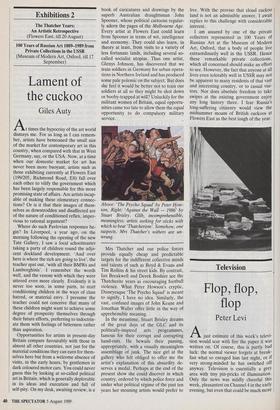Exhibitions 2
The Thatcher Years: An Artistic Retrospective (Flowers East, till 20 August) 100 Years of Russian Art 1889-1989 from Private Collections in the USSR (Museum of Modern Art, Oxford, till 17 September)
Lament of the cuckoo
Giles Auty
At times the hypocrisy of the art world dismays me. For as long as I can remem- ber, artists have bemoaned the small size of the market for contemporary art in this country, when compared with that in West Germany, say, or the USA. Now, at a time when our domestic market for art has never been more buoyant, artists such as those exhibiting currently at Flowers East (199/205, Richmond Road, E8) fall over each other to vilify the government which has been largely responsible for this more promising state of affairs. Are artists incap- able of making these elementary connec- tions? Or is it that their images of them- selves as downtrodden and disaffected are of the nature of conditioned reflex, imper- vious to rational argument?
Where do such Pavlovian responses be- gin? In Liverpool, a year ago, on the morning following the opening of the new Tate Gallery, I saw a local schoolmaster taking a party of children round the adja- cent dockland development. 'And over here is where the rich are going to live', the teacher spat out, 'with all their BMWs and Lamborghinis'. I remember the words well, and the venom with which they were uttered even more clearly. Evidently it is never too soon, in some parts, to start conditioning children in the ways of class hatred, or material envy. I presume the teacher could not conceive that many of these children might want to achieve some degree of prosperity themselves through their future efforts, preferring to indoctrin- ate them with feelings of bitterness rather than aspiration.
Opportunities for artists in present-day Britain compare favourably with those in almost all other countries, not just for the material conditions they can earn for them- selves here but from a welcome absence of visits, in the early hours, by gentlemen in dark coloured motor cars. You could never guess this by looking at so-called political art in Britain, which is generally deplorable in its ideas and execution and full of self-pity. On my desk, awaiting review, is a book of caricatures and drawings by the superb Australian draughtsman John Spooner, whose political cartoons regular- ly adorn the pages of the Melbourne Age. Every artist at Flowers East could learn from Spooner in terms of wit, intelligence and economy. They could also learn, in theory at least, from visits to a variety of less fortunate lands, including several so- called socialist utopias. Thus one artist, Glenys Johnson, has discovered that we train soldiers in Germany for urban opera- tions in Northern Ireland and has produced some pale polemic on the subject. But does she feel it would be better not to train our soldiers at all so they might be shot down or booby-trapped at will? Unluckily for the militant women of Britain, equal opportu- nities came too late to allow them the equal opportunity to do compulsory military service.
Above: 'The Psycho Squad' by Peter How- son, Right: 'Against the Wall — 1986' by Stuart Brisley. Glib, incomprehensible, meaningless: artists seeking for sticks with which to beat Thatcherism'. Somehow, one suspects, Mrs Thatcher's withers are un- wrung.
Mrs Thatcher and our police forces provide equally cheap and predictable targets for the indifferent collective minds and talents of such as Boyd & Evans and Tim Rollins & his street kids. By contrast, Ian Breakwell and Derek Boshier see the Thatcherite years as encouraging football violence. What Peter Howson's cryptic, Disneyesque 'The Psycho Squad' is meant to signify, I have no idea. Similarly, the vast, confused images of John Keane and Jonathan Waller offer little in the way of apprehensible meaning.
In the meantime, Stuart Brisley dreams of the great days of the GLC and its politically-inspired arts programmes, famous for their corrupt and corrupting hand-outs. He bewails their passing, appropriately, with a visually meaningless assemblage of junk. The nice girl at the gallery who felt obliged to offer me the artist's explanation of this absurdity de- serves a medal. Perhaps at the end of the present show she could discover in which country, ordered by which police force and under what political regime of the past ten years her moaning artists would prefer to live. With the proviso that cloud cuckoo land is not an admissible answer, I await replies to this challenge with considerable interest.
I am assured by one of the private collectors represented in 100 Years of Russian Art at the Museum of Modern Art, Oxford, that a body of people live extraordinarily well in the USSR. Hence these remarkable private collections, which all concerned should make an effort to see. However, the fact that anyone at all lives even tolerably well in USSR may not be apparent to many residents of that vast and interesting country, or to casual visi- tors. Nor does absolute freedom to take swipes at the existing government enjoy any long history there. I fear Russia's long-suffering citizenry would view the midsummer moans of British cuckoos at Flowers East as the best laugh of the year.


















































 Previous page
Previous page